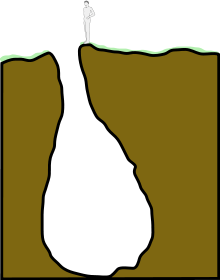Foiba
A foiba (plural: foibas or foibe) — jama in South Slavic languages scientific and colloquial vocabulary (borrowed since early research in the Western Balkan Dinaric Alpine karst) — is a type of deep natural sinkhole, doline, or sink, and is a collapsed portion of bedrock above a void. Sinks may be a sheer vertical opening into a cave, or a shallow depression of many hectares. They are common in the Karst (Carso) region shared by Italy and Slovenia, as well as in a karst of Dinaric Alps in Bosnia and Herzegovina, Montenegro and Croatia.

History
The term "foiba" was used in the 1770s by Italian naturalist Alberto Fortis who wrote a number of books about karst of Dalmatia.[1] It is an Italian derivative of the Latin fovea, meaning "pit" or "chasm". They are indeed chasms excavated by water erosion, have the shape of an inverted funnel, and can be up to 200 metres (660 ft) deep. Such formations number in the hundreds in Istria.
In karst areas, a sinkhole, sink, or doline is a closed depression draining underground. It can be cylindrical, conical, bowl-shaped or dish-shaped. The diameter ranges from a few to many hundreds of metres. The name "doline" comes from dolina, the Slovenian word for this very common feature. The term "foiba" may also refer to a deep wide chasm of a river at the place where it goes underground.[2]
See also
- Karst Plateau (Italy-Slovenia)
- Corsetto Norma
References
- "Alberto Fortis and the Istrian Karst, Croatia. in 1770 and 1771", Acta Carsologica, 2001, 30/1
- Glossary of speleology: letter F
External links
| Wikimedia Commons has media related to Foibas. |
| Look up foiba in Wiktionary, the free dictionary. |